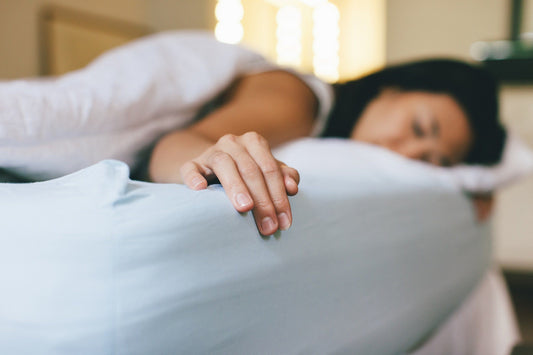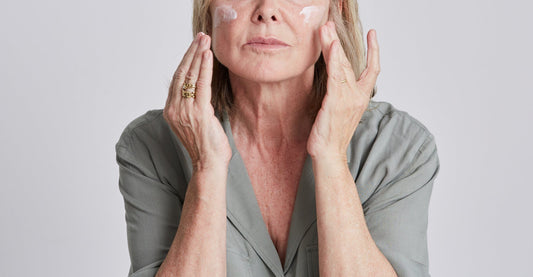If sex after menopause is feeling fraught instead of fun, you’re not alone. Experts estimate that up to 30% of women may experience painful sex after menopause.1 Countless more struggle with other symptoms, including vaginal dryness and decreased sex drive, both leading up to menopause and afterwards. All of this can make sex a lot less appealing. However some women may alternatively notice an increase in libido after menopause.
There are plenty of reasons why these symptoms occur—and many point to shifts or drops in hormones. The female body’s production of the hormone estrogen plummets during perimenopause, or in the years leading up to menopause. When your body is low on estrogen, becoming aroused can take longer and orgasms may weaken—if they happen at all. Low estrogen levels can also cause vaginal tissues to become drier and less stretchy, which can make sex painful after menopause, or even during the transition from perimenopause into menopause. These symptoms can make you less interested in sex and make arousal even more challenging, creating a sort of negative feedback loop.2
This whole experience may sound bleak, especially if you’re not interested in resorting to prescription treatments like hormone replacement therapy. Thankfully, there’s hope for women who would rather to stick to a more natural approach when seeking to how to boost their libido after menopause, along with reducing painful sex and its associated symptoms.
Symptoms Can Impact Sex During Perimenopause and After Menopause
You know when sex just doesn’t feel like it used to. Still, it can sometimes be hard to pinpoint just what the problem is.
Let’s start by taking a look at some of the most common symptoms that affect sex before, during and after menopause. You might have written some of these off as normal or unavoidable—but in fact, these symptoms may have an impact on your overall sensitivity, libido and sexual function:3
- Vaginal dryness, itching, or discomfort
- Painful sex
- More time needed to get aroused
- Absence of orgasm
- Night sweats and disrupted sleep, which can lead to lower energy levels and sex drive4
Since one symptom can often be tied to another when it comes to decreased sexual function, it’s important to talk to your healthcare provider about what you’re experiencing. They may be able to offer advice or suggest specific treatments to fit your individual needs.
To hear more about ways to potentially increase libido after menopause, check out this quick clip from Bonafide Chief Medical Officer, Dr. Alyssa Dweck, below:
How to Boost your Libido After Menopause
Healthcare providers aside, some simple, science-backed strategies and lifestyle changes can go a long way in helping to restore your sexual function and increase libido after menopause—making you feel more like yourself again.
Try Certain Foods for a Postmenopause Libido Boost
A healthy diet can help improve the hormone-fueled symptoms that negatively impact your sex drive after menopause. Incorporating these three changes may help to increase female sensitivity and/or boost your libido after menopause:
- Up Your Veggie Intake to Boost Your Libido After Menopause: Vegetables—particularly leafy greens, beets, and radishes5—tend to be rich in naturally occurring nitrates. These compounds have been shown to relax blood vessels and improve blood flow throughout the body, including to vaginal tissues.6 A decrease of blood flow to the genitals can commonly be experienced during menopause and postmenopause and is often linked to the hormonal changes occurring during this time. Taking steps to increase blood flow to the genitals—by eating the right types of food, for example—can help increase vaginal lubrication during arousal and even increase female sensitivity to physical stimulation.7 Yet another reason to fill your plate with vegetables: this boost in blood flow can give you more energy8 to engage in sex, potentially helping to increase libido after menopause without hormones, (not to mention day-to-day activities like exercise).
- To Soy, or Not to Soy – Is it a Remedy for Menopause Libido?: Soy-containing foods like tofu and tempeh contain phytoestrogens, or estrogen-like compounds that some studies suggest may help improve hormone imbalances as well as alleviate a few symptoms experienced by menopausal and postmenopausal women.9 Not a fan of tofu? Phytoestrogens are also found in foods like chickpeas, peanuts, grapes, berries, and black and green tea.10 But, while phytoestrogens can provide some benefits to hormonal health, they unfortunately don’t come without risks. Even though phytoestrogens are naturally occurring and are often thought of as a safer alternative to synthetic or bioidentical hormones, they do work in the same way in the body and may influence your body’s hormonal balance. Speak with your healthcare provider first before increasing your phytoestrogen intake to increase your libido after menopause, so you can be aware of the risks and discuss any concerns.11
- Help Yourself to Healthy Fats: High purity omega-3 fatty acids, found in foods like fatty fish and in certain dietary supplements, have been shown to help alleviate night sweats12 and ease some feelings of depressed moods.13 This might not directly boost your libido after menopause, but better sleep and experiencing fewer disruptive symptoms throughout the day may give you more energy and improve your mood overall. And sex sounds a whole lot more appealing when you’re feeling your best!
Improve Sex After Menopause with Exercise
That feel-good feeling you get after a workout comes from naturally occurring endorphins, which help to enhance your mood and energy levels—and may help to boost your libido after menopause. But don’t just limit yourself to traditional forms of exercise. Pelvic floor exercises can go a long way towards increasing blood flow to your vaginal tissues before, during and after menopause, and can help strengthen the muscles involved in achieving orgasm.14
Keep Having Sex to Boost Your Libido After Menopause
It might sound counterintuitive but having sex more often can actually make the experience feel better, which may make you want to engage in sexual activity more often. Regular sex promotes healthy blood flow to vaginal tissues and helps to keep vaginal muscles stretchy and toned.15 Continuing to be sexually active may even help reduce painful sex after menopause.
If getting in the mood during or after menopause takes longer than it used to, try dedicating more time to foreplay to improve your sex drive. Be open with your partner and consider suggesting more direct stimulation of your clitoris to get your blood—and natural lubrication—flowing.16 Try adding a personal massager into the mix. A recent study showed that after three months of regularly using a vibrator, two-thirds of postmenopausal women experienced less dryness, more orgasms, and increased female sensitivity and vaginal sensation.17
Consider Small Lifestyle and Communication Changes to Support Menopause Libido
Decreases in estrogen and testosterone that occur as a result of menopause play a major role in the way our body responds to sex. But beyond that, there are other factors that can come into play, such as the way we view our physically changing bodies, the status of our relationships with a spouse or significant other, or the belief that once we hit midlife, we are no longer sexually desirable. Here are a few lifestyle and relationship tweaks that may help to provide a libido boost during postmenopause:
- Embrace Your Changing Body: Different doesn’t mean worse—it just means, different. Maybe things aren’t as tight or perky as they once were—and that’s ok. Our bodies are designed to age. Focus on embracing change during the menopausal transition, controlling the things you can, and playing up the things that make you feel beautiful, like shiny hair, sparkling eyes, or a dazzling smile.
- Communicate With Your Partner: Whether you’ve been with the same person for 30 years or you’re single and actively dating, communication is key. Express what you like—and what you don’t. Find ways to connect—or reconnect, that are not necessarily all about the “big finish.” Take long walks, make out like teenagers in the car, go dancing. Setting the tone can go a long way in setting the mood and increasing libido after menopause. No partner? No problem – self pleasure can also be a very satisfying way to get into the mood and stay there.
- Don’t Be Afraid to Experiment: It’s never too late to try new things. Remember—you’re more mature—not dead! Sex doesn’t have to be so serious—you are allowed to have fun. Try something new or “naughty,” like buying some sexy lingerie, or experimenting with role-playing. Everyone is responsible for their own pleasure, so don’t forget to do that too! And don’t worry if it seems “funny” at first---laughter is a great form of foreplay.
Try Boosting Your Postmenopause Libido with a Dietary Supplement
Choosing the right vitamins, supplements, or natural alternatives can go a long way towards promoting comfort and increasing female sensitivity and sex drive after menopause. These types of solutions can help make your sex life more satisfying both during and after menopause. Here are some options to consider:
- Remedies for Menopause Libido When Dealing with Vaginal Dryness and Painful Sex After Menopause: Natural lubricants can be an effective option for providing much-needed moisture to dry or tight vaginal tissues. One of the more popular natural lubricants is virgin coconut oil, which has been clinically studied and shown to be both safe and effective as a moisturizer.18 Women may prefer to use unrefined, virgin coconut oil because it’s the least processed. Coconut oil also tastes and smells great, while providing noticeable moisture and lubrication. Other natural oils that can provide lubrication include olive oil, avocado oil and jojoba oil. It’s important not to use any of these options alongside the use of condoms, however, as they may weaken the integrity. Aloe Vera can serve as an effective alternative to oils if you are using condoms and still looking for a natural lubrication option.19 It’s always best to consult with your healthcare provider before trying any of these remedies for menopause libido, dryness or painful sex, in the event you have questions about how to use them or if you have concerns about allergies.
Natural oils may help to provide vaginal lubrication in the short term. But if you’re menopausal and experiencing vaginal atrophy, along with its associated symptoms of dryness, irritation, burning and painful sex, a longer lasting vaginal moisturizer that uses clinically studied, safe ingredients may be a better option for you. Hyaluronic acid, which already occurs naturally in the body, can be effective for addressing vaginal dryness in the short- and long-term. This ingredient is considered to be a super-moisturizer, as it can retain up to 1000x its weight in moisture.
- Vitamins to Boost Libido and Increase Female Sensitivity: There are a handful of naturally occurring herbs and supplements that have been shown to provide a boost in libido after menopause. However, in-depth scientific studies around these options have not yet been completed and more research is needed to determine their true benefits. Several of the most common herbs linked to enhancing sex drive in women include:
- Ginkgo biloba, which in some studies has demonstrated a positive impact on blood flow, increasing arousal and relaxing smooth muscles, like those in the vagina
- Maca, which has been historically used to help enhance fertility and sexual desire in both men and women
- Saffron, which may help to improve sexual arousal in women, along with improving lubrication and decreasing pain.20
Naturally occurring ingredients that work to increase circulation and blood flow to the genitals can also help increase female sensitivity, response to sexual stimulation, and orgasm. These ingredients have been shown to work by helping your body safely enhance the levels of nitric oxide in the blood, which in-turn, can help relax and expand blood vessels, leading to increased vaginal sensation, stimulation and improved sexual pleasure.21 While the desire to have sex and physical sexual arousal are two separate events, they certainly influence one another. If overall sexual sensation and satisfaction improves, it may have a positive effect on how much and how often you want to have sex over time.
During perimenopause and after menopause, sex shouldn’t hurt—or feel like a chore. Healthy habits and supplements might not solve the problem overnight. But with a little bit of time and commitment, they might be all you need to get excited about intimacy again and boost your libido after menopause.
Resources
- https://newsnetwork.mayoclinic.org/discussion/womens-wellness-painful-sex-after-menopause/
- https://www.hopkinsmedicine.org/health/wellness-and-prevention/how-sex-changes-after-menopause
- https://www.womenshealth.gov/menopause/menopause-and-sexuality
- https://onlinelibrary.wiley.com/doi/abs/10.1111/jsm.12858
- https://nutritionfacts.org/2018/02/22/which-vegetables-have-the-most-nitrates/
- https://pubmed.ncbi.nlm.nih.gov/22882425/
- https://www.sciencedirect.com/topics/medicine-and-dentistry/vaginal-lubrication
- https://academic.oup.com/ajcn/article/90/1/1/4596750
- https://www.researchgate.net/profile/Ramin_Sadeghi2/publication/282760441_The_application_of_soy_isoflavones_for_subjective_symptoms_and_objective_signs_of_vaginal_atrophy_in_menopause_A_systematic_review_of_randomised_controlled_trials/links/561e1a5808aef097132b2fae/The-application-of-soy-isoflavones-for-subjective-symptoms-and-objective-signs-of-vaginal-atrophy-in-menopause-A-systematic-review-of-randomised-controlled-trials.pdf
- https://www.ncbi.nlm.nih.gov/pmc/articles/PMC2781234/
- https://www.healthline.com/health/phytoestrogens#risks-and-side-effects
- https://pubmed.ncbi.nlm.nih.gov/30056356/
- https://www.healthline.com/nutrition/omega-3-fish-oil-for-brain-health. Healthline 2017
- https://www.womenshealth.gov/menopause/menopause-and-sexuality
- https://www.menopause.org/for-women/sexual-health-menopause-online/frequently-asked-questions
- https://www.hopkinsmedicine.org/health/wellness-and-prevention/how-sex-changes-after-menopause
- https://www.health.harvard.edu/womens-health/yes-you-can-have-better-sex-in-midlife-and-in-the-years-beyond
- https://www.healthline.com/health/coconut-oil-sex#benefits
- https://www.healthline.com/health/healthy-sex/natural-lube#products-to-try
- https://www.healthline.com/health/sex-drive-foods-female#some-evidence
- https://www.womenshealthnetwork.com/sexual-health/l-arginine-to-boost-libido/












Comments
Post comment